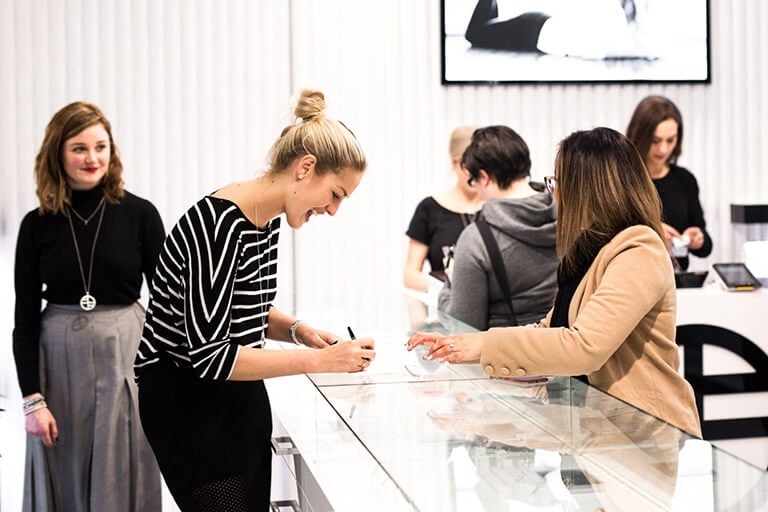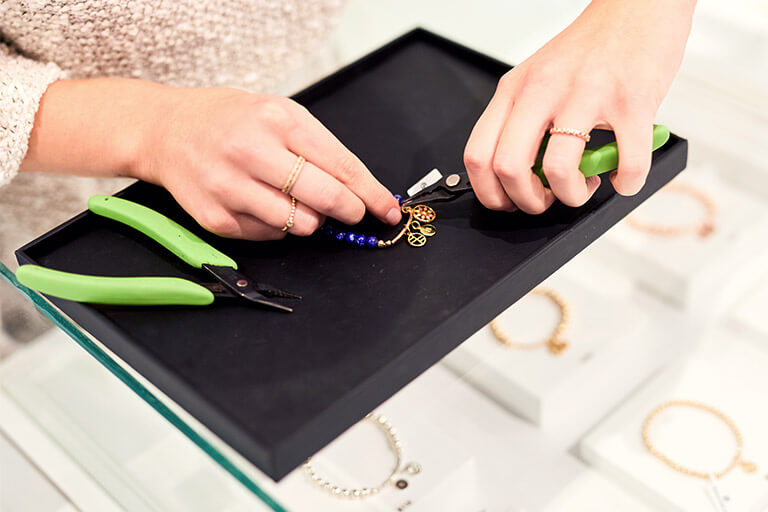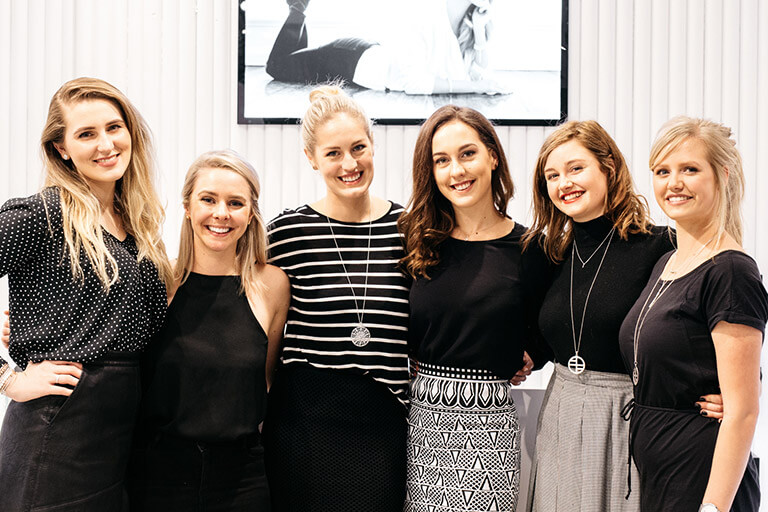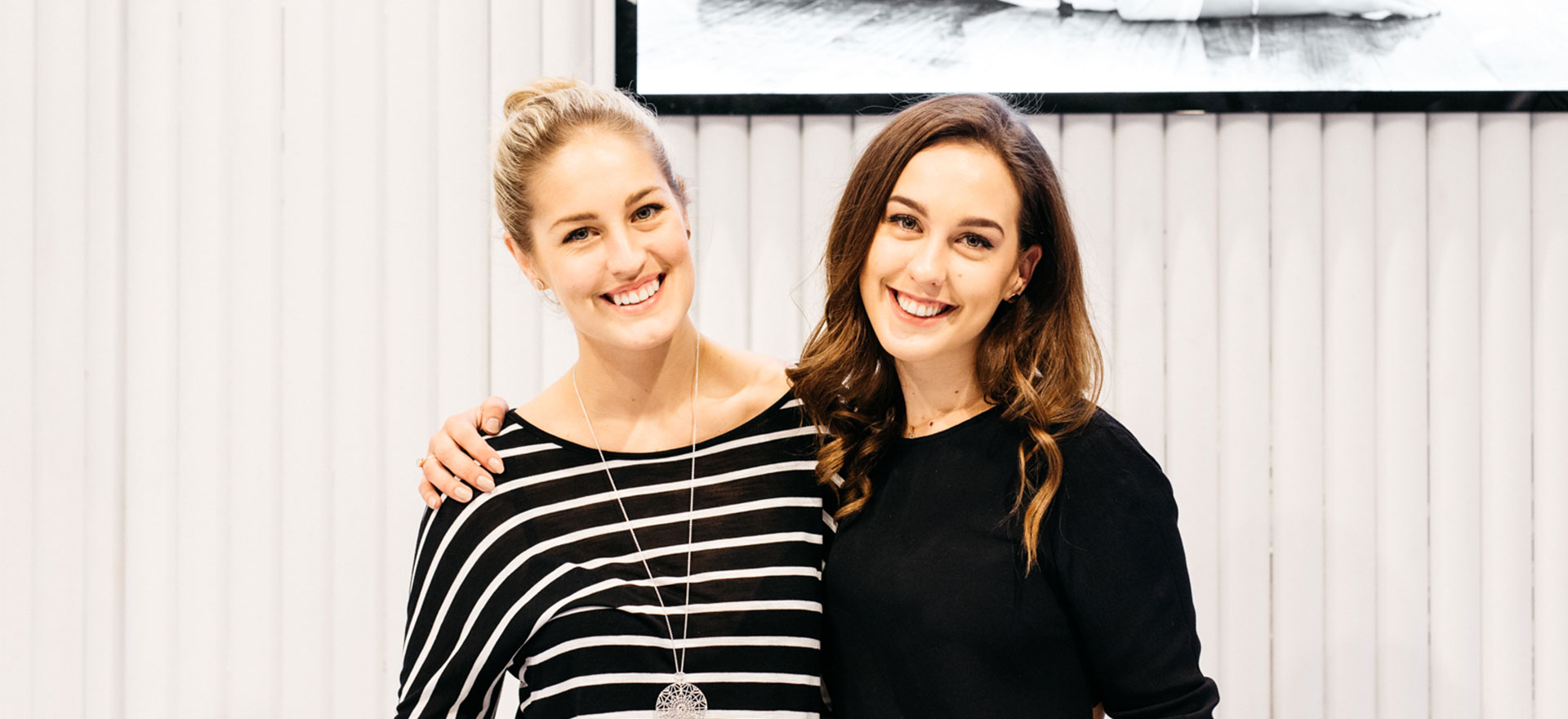Hannah Vasicek (left) first ventured into business aged 12, but being her own boss wasn't always the plan. She was going to be a doctor, then a lawyer, instead she pursued her passion and built a million dollar jewellery business from the ground up.
“My business journey started when I was 12 years old. We lived in rural NSW in a town called Hawksnest and I had to travel two hours to and from school in the Hunter Valley. It was a long bus ride and I saw an opportunity to start my first business, which was selling lollies. I bought a tub of lollies wholesale for about $20 and sold it all for $120 and I was selling two to three a week. I enjoyed the challenge of finding a demand and supplying the need, so that’s how my entrepreneurial interest began.”

It started with passion
Keen to encourage her daughter’s entrepreneurial flair, Hannah’s mum took her to a bead store and she quickly became enamoured with making and selling jewellery. It became her core creative outlet and she did it at every spare moment. She sold her creations to friends, parents, teachers – anyone who would look at her stuff. Then, when she was 16 years old, her family moved to Hobart and her business would take its next big growth step.
“I took it to a gallery and they agreed to sell it for me. They were selling it for three-times wholesale and they sold out every week. So I decided to cut them out and go direct to the customers and started a stall at Hobart’s famous Salamanca Markets and it was great. I had direct contact with my customers so I did a lot of customer research and experimented with different marketing techniques and pricing. My business was originally called Handmade by Hannah, but after a rebrand and identifying I wanted to scale the business, I changed the name to Francesca.”

“Once I started selling and doing well at the Salamanca Market, it dawned on me that I didn’t necessarily need to work for someone else.”
A change of plans and a leap of faith
Hannah never intended for Francesca to become her full-time job. She had plans to become a doctor but, during her final year of school, Hannah’s mum became sick. Spending the year in and out of hospital seeing doctors working super long hours turned her off that and she enrolled in a Science-Law degree. She continued running Francesca – working one day a week – which supported her living out of home and enjoying trips overseas during the uni holidays.
“During my fifth and final year of uni, I was majoring in physics and maths, and I finally acknowledged I really was not enjoying it. I entered a competition run by the Entrepreneurs Organisation and totally forgot about it. I was in a law lecture one afternoon and got an email congratulating me on making it into the top four businesses in the Global Student Entrepreneur Awards. I had to fly to Melbourne the next week and present my business to a panel of judges. At this stage, Francesca was still just one day a week so I presented on where I thought I could take my business. We had already rebranded as Francesca and I’d shifted my target audience to be more in line with my peer demographic, whereas it was very much an older demographic under Handmade by Hannah.
In my last week of uni, I flew over to Melbourne, presented Francesca and I won. As part of it, I won an all-expenses-paid trip to New York City and I stayed at the Waldorf Hotel and presented Francesca at the World Trade Centre against 30 of the best entrepreneurs from around the world. That experience made me believe I could turn the business into a career.”
Turning a hobby into a million dollar business
“Originally making jewellery was a creative outlet for me. I looked at other jewellery out there and could see ways to make it better and simpler and I could see an opportunity for a different style that I couldn’t find anywhere. I was studying such dry subjects at uni so it was a creative respite for me. Once I started selling and doing well at the Salamanca Market, it dawned on me that I didn’t necessarily need to work for someone else.”
In her first year out of uni, Hannah was headhunted by a prestigious law firm that usually only hires from its clerkship program. They heard about her success building Francesca – a small taste of the growth to come in subsequent years – and offered her a job with a caveat that she would need to choose between the law job and her business. She had reached a distinct crossroads in her life. She turned to the ever-reliable source of wisdom in her dad.
“I called my dad and told him the situation. I thought he’d suggest I take the stable path, but he told me to do whatever makes my time rich. I didn’t want to be a doctor because it takes up so much of your life, so after dad said that, I knew I needed to go all in on Francesca.”

Working harder and smarter
Alongside studying full time and running Francesca, Hannah took on a Business Diploma. You know, just to see if she’d like it. And she did. In fact, she enjoyed it so much more than her five-year degree it helped her decide to turn Francesca into a brand rather than just wholesaling.
“I actually found a space that had a retail shop downstairs so decided to sell directly instead of just wholesale. I worked in a law firm two days a week to cover the rent on the shop and opened the store and within six months business was cranking. We hired our first employee and at the start of the next year, 2014, we were invited to the Golden Globes.
We successfully crowdfunded to get there and while the actual event was a bit of a flop for the business – we had no sales – the exposure from the crowdfunding was amazing. People really bought into the idea that a small Tasmanian brand was going to Hollywood so we had a lot of press coverage around that.”

“For the first three years, we doubled revenue every year. We’ve had crazy growth and the biggest factor in stunting our growth has been working capital.”
Working capital and growth
The first store Hannah opened was on the outskirts of Hobart. It was a destination store that was successfully pulling customers, but being nestled between furniture stores and large warehouses didn’t fit with the high-end store Hannah had planned for Francesca. She found an opportunity to move into a shopping centre alongside more congruous brands – large national retailers. And Hannah knew this was an opportunity to create a stand-out retail experience for her customers.
“It was a big risk because the fit-out cost $75,000, which was a lot of money for the business at that time. When we opened we had a really strong response from customers, people were saying the store looked like it belonged in New York City and we quadrupled revenue on our opening day.”
About a year after launching Francesca, Hannah convinced her sister Rachael to ditch uni, join the business and develop a role for herself. She is now head of marketing and together they have helped Francesca grow exponentially. Throughout the years, one factor above all others has throttled growth – working capital.
“For the first three years, we doubled revenue every year. We’ve had crazy growth and the biggest factor in stunting our growth has been working capital. We wanted to open a store in Melbourne, but didn’t have the working capital, so we crowdfunded, successfully opened and, shortly after, we needed even more capital for more inventory for the Christmas season. That’s when we reached out to Moula.
Our business is very seasonal, in the middle of the year we’ll have a month that is 4% of our yearly revenue and over Christmas that will jump up to 20%. So we need to start making and producing in those quiet months so we can have stock ready to make the most of those busy months, and working capital is crucial for that.”
Invest in people, grow your business
One of Francesca’s cornerstone values in personal development. Hannah says the majority of her focus is on empowering staff, nurturing their motivation and helping them learn and develop as people. She sees her staff – 30 women under 30 years of age – as the most critically important aspects of the business. Hannah just wants her staff to feel empowered and motivated. And a critical aspect of that empowerment is looking past the traditional value placed on university degrees.
“We don’t require uni degrees for someone to excel in their role because I feel like I wasn’t any better off after my degree. When looking for new talent to join our team, there are four things I look for that cannot be taught – work ethic, curiosity, taste and a positive personality. If someone has these attributes, you can teach them anything. Then all I need to do is upskill them and manage their career progression and they work towards that. If someone ticks all the boxes in terms of knowledge but doesn’t have the taste to know what’s good in our industry, or curiosity to learn or the work ethic to knuckle down when things go wrong, it is ten times harder to teach that someone who has that but lacks the knowledge. I listened to an interview with the founder of WordPress and he said he’s where he is today not because he had the talent ten years ago, but because he had the work ethic to learn. Only one of my staff has a degree relevant to the area in which she works.”
Tips for growth
We asked Hannah for some tips on achieving even a fraction of the successful growth she has earned with Francesca. Her tips are succinct: you need to spend money to make money, just do it strategically. And beware of growth – it can make and break businesses.
- You need to spend money to make money. Just do it strategically. “Growth can be achieved in so many different areas of the business but you need to calculate the ROI before your spend. If you want to put money into Facebook advertising, you need to know what kind of return you can get on your investment. Or if you’re growing so much that you need to hire more staff, working out how much it will cost you to find the right hires against how much of your own and existing staff’s time it will free up to help grow the business.”
- Growth is great, but it’s a business killer. “Calculated growth and risk assessment are the two most important factors in sustainable growth. I was too risk-averse in the beginning, but now I actively seek out challenges because you can learn so much from them.”

Growing into the future
The future for Francesca is simple: keep growing and looking after its staff. Hannah’s shifting her focus internally for the new few months to ensure her processes, spending and staff are in good places before any future growth plans.
“We’ll be fine-tuning our operating expenses and making sure we’re lean. When you grow a lot, it’s easy for everything to expand, especially expenses. So I’m evaluating the ROI of every dollar we spend and, in the short-term, we will lay a strong foundation for future growth. We’re doing a bit leadership assessment to ensure we’re doing the right things as leaders before we grow too. Ensuring everyone is empowered and there’s clear progression for their careers because that’s really important for the business. Our long-term goal is to scale our online presence and open more stores if that makes sense to do so down the line.”
In the spirit of transparency, we asked Hannah to share a catastrophic muck-up she’s experienced and it’s a ripper. If you’ve read this far, you’ll probably enjoy seeing how Hannah turned a $50,000 mistake into a positive for Francesca.




